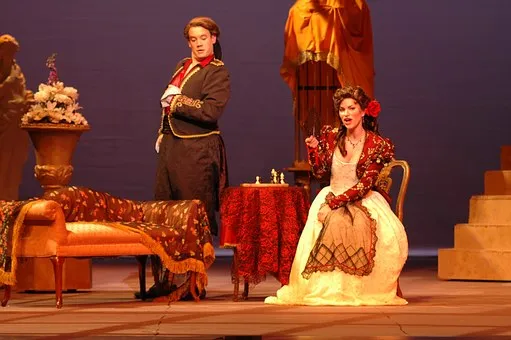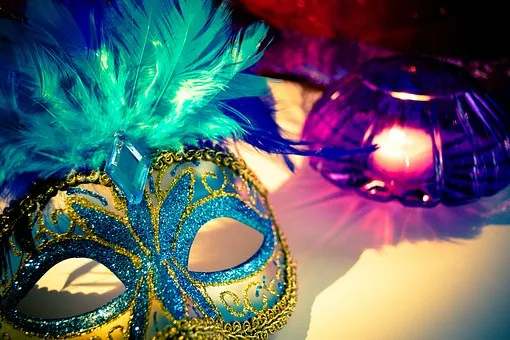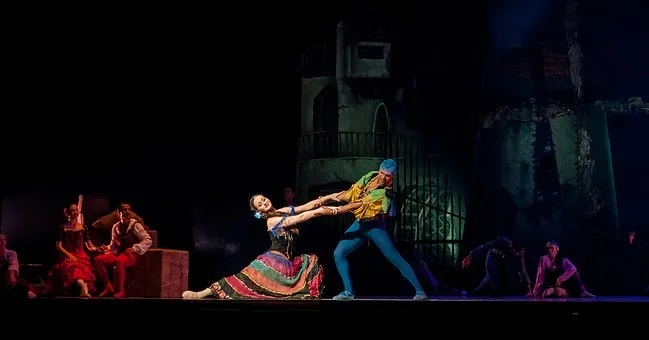Would you spend ten dollars to see a foreign movie, if you didn’t understand the language and there were no subtitles? Probably not, though you might be able to deduce the storyline though scenic context. So why consider investing six to sixteen times that sum to attend an opera, the plot of which you have little hope of understanding?
Many people believe that opera is primarily an opportunity to show off well-trained voices. While it is true that good opera composers exploit the human voice to an extent that only vocal superheroes now grace the opera stage, three hours are not necessary to demonstrate vocal prowess—it takes only a five minute aria with a high extended “money-note” near the end. No, operas are more about musical drama than vocal gymnastics.
In the “good old days” before moving pictures, even before electricity, opera fulfilled the role that film and television do now—it was entertainment for the masses, and the masses attended in droves, young and old alike. Going to an opera was a “hip date” for a courting couple.
Proportionately, more people attended operas than now attend movies; they awaited the next Mozart or Wagner production with the same anticipation now afforded to films by Spielberg or Gibson.
Dozens of opera houses permanently close their doors every year, even government-subsidized opera companies in Europe. The Three Tenors has been the most successful classical recording in history, yet the number of copies that recording sold, compared to the number of copies a typical pop-recording sells, was minuscule. If The Three Tenors been a pop group, its sales would have justified dropping the group’s contract. From the perspective of recording companies, “serious” music has been subsidized by pop music since the advent of the audio CD. When you attend an opera, your support helps preserve the highest form of art the world has ever known.
Opera is truly the pinnacle of high art; it merges the other temporal and plastic arts. It’s not just music, it’s not song or poetry, it’s not just drama, it’s not ballet or modern dance, it’s all that and more—even the sets may be designed by a well-known visual artist, with special effects that rival those of Hollywood.
Everything works together to present a story, so if you don’t understand the libretto (the words), you won’t understand how any of the other elements connect to the plot. Consider the fact that when God wanted to scatter the people of the world he confused their language, and if you attend an opera presented in a language you cannot understand, you will surely be among those who scatter far and wide as well, the next time the opera is in town. Conversely, when God wanted to get a message across quickly, he let every man hear it in their own tongues.

The first rule to becoming an opera lover is: find an opera in your native language, don’t count high school French studies as enough to get you through Bizet’s Carmen, Offenbach’s Les Contes d’Hoffmann (Tales of Hoffmann), Debussy’s Pélleas et Méllisande, or Ravel’s L’Enfant et les Sortilèges (The Child and the Enchanted Visions). Even college-level German won’t get you through Mozart’s Die Zauberflöte (The Magic Flute) or Die Entfürhrung aus dem Serail (The Abduction from the Seraglio), Wagner’s Parisfal, Strauss’s Salome, or Berg’s Wozzeck. And forget Italian; few, except native Italians, ever comprehend the language well enough to understand Italian opera—a pity, because some of the best operas are in that language.
Instead, find productions in English; many universities perform the great operas in English translation—although probably a greater number avoids this practice as a matter of principle. You may be surprised to learn that many operas are written in English, particularly those of English-speaking composers such as Benjamin Britten, Ralph Vaughan Williams, Gian Carlo Menotti, Douglas Moore, Robert Ward, Carlisle Floyd, or Dominic Argento.
Some opera houses project translations above or below the stage, but you will not experience the connection between the words, music, and drama intended by the composer unless you hear the singing in English. You need native-speaker fluency to experience the totality of the work, otherwise you will, of necessity, divide it into its linguistic dimension versus all its other aspects.

If the thought of sitting through a three-hour grand opera terrifies you, consider starting with traditional “light” musical theater first, or work your way through progressively “deeper” genres, from dinner theater, to musical theater, to operetta, to large comic opera, to a full-blown tragedy. Tip: Gilbert and Sullivan counts as operetta. Similarly, some musicals reach such a high level of musical composition that one imagines they continue to be called musicals simply to avoid the audience’s stigma for opera; a good example is Stephen Sondheim’s Sweeney Todd.
Another “warm-up” exercise before attending the “big one” would be an evening of one-act operas. The opera departments of many colleges and universities present such evenings, and often the works—usually twenty to forty minutes in length—are in English. Popular examples include: Mozart’s The Impresario or Bastien und Bastienne, Douglas Moore’s Gallantry or The Devil and Daniel Webster, works by Kurt Weill, Leonard Bernstein’s Trouble in Tahiti, Samuel Barber’s A Hand of Bridge, Vaughn Williams’ Riders to the Sea, and Menotti’s The Medium or The Telephone. Going this route has the added advantage of exposing you to music from several historical periods or a range of 20th century schools of musical thought.

Don’t excuse yourself because you haven’t got the wardrobe; there is no dress code at the opera! However, the opera is a perfect place to wear costly outfits for which you might otherwise not find a context. Furthermore, an evening at the theater is the perfect place for fashionable attire because a slight majority of people always dress up for the opera. That having been said, many members of the audience will arrive dressed as they would to any other large-scale spectacle such as a baseball game, circus, or museum. This writer has been to hundreds of operas and rarely, if ever, worn a tie. My experience is that the most dressed up people at operas—speaking about operas performed in foreign languages without visible translation—are the people who know the least about opera. Who else is going to subject themselves to three hours of incomprehensible vocal shenanigans without a clue about the plot, sweating in a tight outfit, and probably tight shoes as well?
Plots and your personal definition of political correctness:
A large-scale opera will likely contain a murder, suicide, at least one prostitute, and an adulterous affair or two, maybe even a dance number (if any of these offend you, stop reading here). Face it; love triangles and infidelity, along with the repercussions thereof, including vengeance and retribution leading to horrible deaths, form the underlying themes of many tragic operas.
A surprisingly large number of operas and musicals focus on spiritual themes. Menotti’s Amahl and the Night Visitors, Britten’s Prodigal Son and The Fiery Furnace, and Strauss’ Salome are good examples. Many operas concern Joan of Arc. Selling one’s soul to the devil is a recurrent theme. Warning: although the title may draw you to it, skip Schoenberg’s Moses and Aaron unless you want to be turned off from opera for the rest of your life. It takes several college music degrees plus a certain type of personality to appreciate Schoenberg’s dodecaphonic music; most lay people who make up the audience cannot sit through ten minutes of it, must less, nearly three hours.
When one’s belief system come to the forefront, so does the potential for discord, and not in the musical sense. Depending upon one’s beliefs, certain spiritually centered musical theatre works might cause offense. Conservatives Christians might want to do some extra research before attending Schwartz’s Godspell and Andrew Llloyd Webber’s Jesus Christ Superstar. However, a work like Webber’s Whistle Down the Wind is an fascinating treatment of Christian themes, and a good place to start any journey into the world of opera.
Keep in mind that most operas deal with social and historical issues, and therefore, you may find greater enjoyment attending those works that reflect your personal interests. Do you like boats? Try Argento’s The Last Voyage of Edgar Allen Poe. Interested in passport and visa matters? Try Menotti’s The Consul. Fascinated by divine healing? Try his Amahl and the Night Visitors. Are you a war buff? You’ll certainly enjoy We Come to the River by Hans Werner Henze.
With a few exceptions, you will have a better experience with works by confirmed “opera composers,” rather than those by composers who have written a single opera, the motivation for which might have been simply to round out their catalog—to have a work available for every possible request. This notwithstanding, “one-hit-wonders” like those in the popular music realm, exist in opera too; a good example is Bartok. His only opera, Duke Bluebeard’s Castle, is thoroughly engrossing, although this is probably because Bartok was conversant with other forms of musical drama such as ballet and mimodrama. On the other hand, Beethoven’s Fidelio is usually boring, unless the stage director can rescue it by providing a striking visual element.
Serious music divides into several clearly delineated style periods: baroque, classical, and romantic, followed, in the twentieth century, by impressionism, expressionism, neo-classicism, and neo-romanticism. Further, there are compositional trends defined by methodology: dodecaphony (12-tone serial music), aleatory (in which elements occur by chance), minimalism, and so forth. Make an effort to learn what you like before you pick your first opera so you don’t find yourself trapped for three hours forced to listen to music you hate from a stylistic standpoint. If you don’t like neo-classicism generally, you probably won’t like Stravinsky’s The Rake’s Progress.
As if musical style preferences weren’t enough to have to sort out, you may find the approach to stage direction to be the make-or-break factor. Nowadays, there is a move to contemporize operas to increase their appeal. Stage directors like Peter Sellars go as far as to set baroque operas on the planet Mars hoping that this will bring in a larger audience. Although Sellars is among the most visible, this practice has been going on for decades, notably with productions of Wagner’s Neolithic Ring des Nibelungen “revised” to appear to take place in the early twentieth century. Horrors!
We return to the matter of language for some final caveats: read an English version of the libretto in advance, even if the opera is to be sung in English. This will allow you to experience the unity of the entire stage production, instead of having to devote a disproportionate part of your attention to just grasping the story.
If you must attend an opera in a foreign language, consider bringing a translated libretto (and a small flashlight) to the performance, even at subtitled performances. It is not a coincidence that most opera composers repeat the same lines over and over when setting a libretto to music—they want you to understand them!
As with many things in life, first impressions are lasting impressions. It is important that your first opera make a good first impression; otherwise, the odds are that you will never return to the theater. Follow the steps listed in this article and you might end up a repeat attendee. If you don’t like your initial opera experience, give it a second chance; remember, Mozart wrote forty symphonies but most people enjoy only three or four. Have no fear, there are downright enjoyable operas out there; it’s not all merely unintelligible caterwauling.